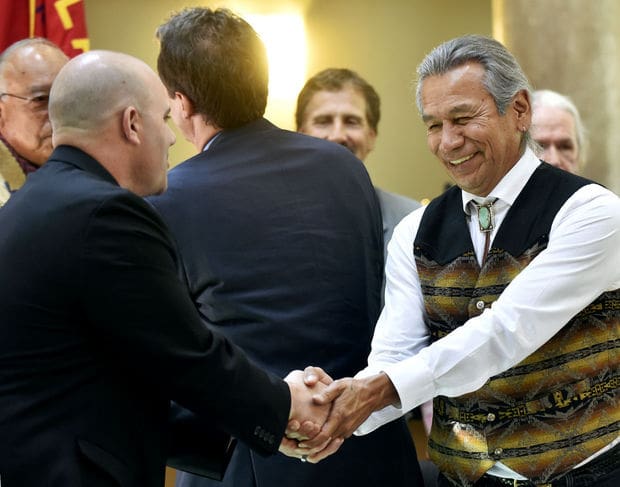As seen on Missoulian

PABLO – After all the years it took to get the Confederated Salish and Kootenai water compact negotiated and passed by the Montana Legislature, the 30-minute delay for Thursday’s ceremonial signing of the bill by Gov. Steve Bullock at CSKT Headquarters didn’t seem to bother anyone.
It didn’t even matter that the person who held it up – state Sen. Chas Vincent, R-Libby, who got stuck in road construction en route to Pablo – was the same person who had worked so hard to derail the compact in 2013.
Vincent, who eventually carried a “tweaked” version of the first compact this year, was praised for his willingness to dive into the details of the contentious compact, learn what it contained and help convince enough of his fellow Republican lawmakers that the changes made had produced an agreement in the best interests of Montanans.
“I’m a pretty good student,” Vincent told a large crowd inside CSKT’s Tribal Council Chambers, “but you’re only a good student if you have good teachers.”
He thanked Attorney General Tim Fox’s office, Montana Reserved Water Rights Compact chairman Chris Tweeten and commission attorney Melissa Hornbein for helping him understand the ins and outs of the complicated agreement.
His relationship with Tweeten, Vincent admitted, “started on some shaky ground.”
Bullock, a Democrat, said it had been impressive to watch the GOP’s Vincent address issues associated with the compact during legislative committee hearings, when there were “passionate feelings on both sides.”
“Chas and I are not usually on the same side,” Bullock said, “but the fact that we’re both standing here today celebrating this accomplishment should tell you everything you need to know about how fair this compact is.”
“It was such an intense learning curve,” Vincent said, but after seeing key changes made to the 2013 version he had opposed, “I thought maybe someone like me needed to pick up the pole” and carry the bill in the Legislature.
It faced stiff opposition from some irrigators on the Flathead Indian Reservation, and some people off the reservation who felt it ceded too much control to the tribes.
“Strong relationships have been strained, and even broken” during the laborious process, Vincent said.
“Now we need to deliver on what we told people it was going to do,” he added. “We need to show we meant what we said, and what we said is true.”
***
Although the signing was ceremonial – Bullock officially signed the bill soon after it passed the Legislature, by 34-16 in the Senate and 53-47 in the House – CSKT Chairman Vernon Finley said it was a significant day.
“It’s a humbling experience because so many people have done so much work on this for so long,” said Finley, in his first year as tribal chairman. “I say it’s humbling because … I come along at the end and get to take part in the photo ops.”
Finley singled out Vincent as “the one who worked hard to make sure it didn’t pass last time, and carried it through this time,” and state Rep. Dan Salomon, R-Ronan, who sponsored the 2013 bill.
“There was nothing easy about getting it to this stage,” Bullock told the crowd. When the compact faltered in 2013, the tribes and state “redoubled their efforts,” he said, and praised those legislators who “put politics aside” and supported the final version.
Congress and the Tribal Council must still approve the compact, and the process in Washington, D.C., could take several more years.
“I’m just as committed to getting it through the next stage,” Vincent said.
It is far more preferable, he explained, “to negotiate, rather than litigate, the outcome.”
